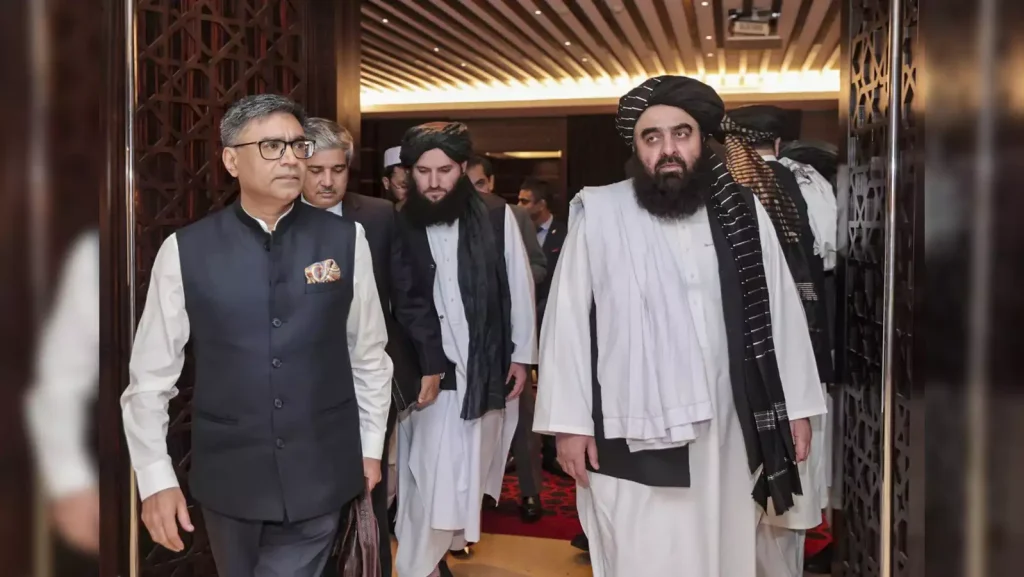India’s Foreign Ministry announced on Wednesday that the country is considering engaging in development projects in Afghanistan, despite the absence of formal diplomatic ties. The announcement followed a significant meeting in Dubai between Indian Foreign Secretary Vikram Misri and Afghanistan’s Acting Foreign Minister Mawlawi Amir Khan Muttaqi. This was the first publicly acknowledged high-level interaction between India and the Taliban government since its takeover in 2021.
According to India’s statement, the Afghan side requested material support for the health sector and refugee rehabilitation. India responded by promising further assistance in these areas as an immediate measure. Discussions also included broader bilateral relations and regional developments, with the Afghan delegation reassuring India of its security concerns. Both sides agreed to maintain regular contact and expand cooperation in key sectors.
India reiterated its historical friendship with Afghanistan, highlighting strong people-to-people ties. The Indian Foreign Secretary expressed readiness to support Afghanistan’s developmental needs and emphasized India’s commitment to ongoing humanitarian programs. The Afghan side appreciated India’s engagement, especially in light of current developmental challenges.
A key outcome of the meeting was the agreement to promote cricket as a tool for cultural and social engagement, a sport that resonates strongly with Afghanistan’s youth. Furthermore, both parties agreed to facilitate trade and humanitarian aid through Iran’s Chabahar Port, reducing reliance on other routes.
On Afghanistan’s side, Acting Foreign Minister Muttaqi thanked India for its continued humanitarian assistance and expressed hopes of improving diplomatic ties, including facilitating visas for Afghan students, patients, and traders. He also assured India that Afghanistan poses no security threats and reaffirmed the Taliban government’s desire for political and economic relations with India. India, in turn, acknowledged the Taliban’s efforts in combating drug trafficking and corruption, further signaling a willingness to deepen political and economic cooperation.
Meanwhile, a former Pakistani ambassador to Afghanistan, Mansoor Ahmad Khan, commented that India’s growing engagement with Afghanistan is a predictable outcome of strained Pakistan-Afghanistan relations. He emphasized that Pakistan should work towards rebuilding ties with Afghanistan to address mutual concerns.
India has maintained humanitarian support for Afghanistan, sending shipments of wheat, medicines, vaccines, and winter clothing. However, it does not recognize the Taliban government and closed its Kabul embassy in 2021 after the Taliban seized power. Afghanistan’s embassy in New Delhi also ceased operations in November 2023 due to visa and administrative challenges faced by Afghan diplomats.
The news of India’s potential re-engagement in development projects in Afghanistan is significant, especially in the context of Pakistan-Afghanistan relations. This development carries implications for regional dynamics, security, and diplomacy.
India-Afghanistan Relations
- Renewed Engagement: India’s willingness to engage in development projects reflects its strategic interest in maintaining influence in Afghanistan, despite not recognizing the Taliban government.
- Symbolic Support: By committing to humanitarian aid and discussing development projects, India aims to maintain goodwill among the Afghan populace, particularly through sectors like health, refugees’ rehabilitation, and cricket, which have strong societal impact.
- Chabahar Port Cooperation: Promoting trade through the Chabahar port strengthens India’s strategic connectivity with Afghanistan, bypassing Pakistan. This undermines Pakistan’s traditional role as a transit country for Afghan trade.
- Non-Recognition but Cooperation: India’s cautious approach of engaging with the Taliban without formal recognition underscores its pragmatic balancing between geopolitical interests and international diplomatic norms.
Impact on Pakistan-Afghanistan Relations
- Growing Distance: Strained ties between Pakistan and Afghanistan, marked by border skirmishes, trade disruptions, and accusations of harboring militants, have created opportunities for India to expand its influence in Afghanistan.
- Security Concerns: The Afghan side’s acknowledgment of India’s security concerns signals a possible alignment on counter-terrorism issues, potentially sidelining Pakistan’s traditional narrative of being a key security partner for Afghanistan.
- Perception of Rivalry: India’s increased engagement might be perceived in Pakistan as an attempt to diminish its influence in Afghanistan, exacerbating tensions.
- Diplomatic Vacuum: Pakistan’s strained relations with Afghanistan and inconsistent policies might allow India to position itself as a reliable partner for development and trade.
Challenges for Pakistan
- Strategic Competition: India’s potential collaboration with Afghanistan, including economic and sports diplomacy, challenges Pakistan’s historic ties and influence over Afghan policies.
- Border Management Issues: Continued issues at the Pakistan-Afghanistan border, including the closure of trade routes, add to the frustration of Afghan traders and may push Afghanistan closer to India.
- Diplomatic Engagement: Pakistan’s approach to dealing with the Taliban government has been marked by inconsistencies, leaving room for India to fill the void.
Opportunities for Pakistan
- Rebuilding Relations: Pakistan must focus on addressing mutual concerns with Afghanistan, including security, trade, and people-to-people connections, to counterbalance India’s growing influence.
- Leveraging Shared History: Pakistan has cultural, linguistic, and geographic ties with Afghanistan, which can be revitalized through trust-building and consistent diplomacy.
- Collaboration in Trade: Strengthening trade routes and ensuring smoother border operations could restore goodwill and reduce Afghanistan’s reliance on Chabahar and other alternatives.
India’s renewed interest in Afghanistan poses a strategic challenge for Pakistan. However, it also serves as a reminder for Pakistan to reassess its policies towards Afghanistan. By addressing bilateral issues proactively and presenting itself as a dependable partner, Pakistan can maintain its pivotal role in Afghanistan’s development and stability. A collaborative and inclusive regional approach remains essential to counter external influences and achieve shared goals of peace and prosperity.


